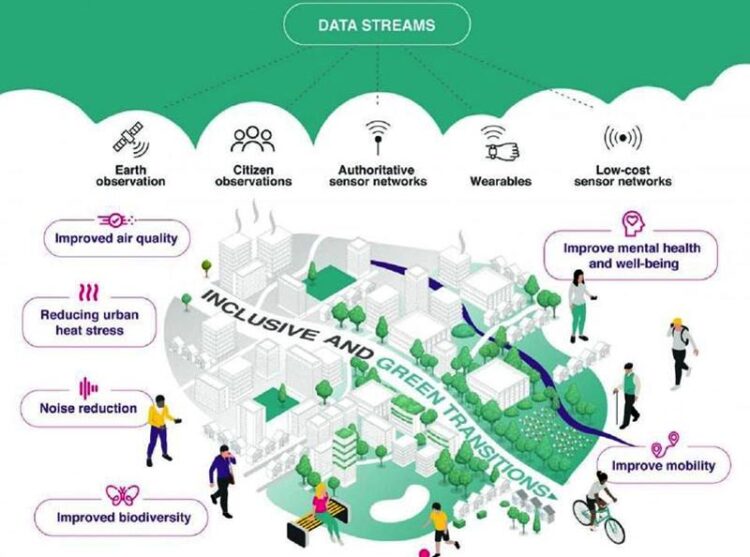Driving inclusive and green urban transitions

Schematic representation of the methods and goals of Urban ReLeaf
(c) Urban ReLeaf
A new Horizon Europe project led by IIASA, called Urban ReLeaf, leverages citizen science for public sector innovation.
Urban ReLeaf aims to co-create citizen-powered data ecosystems to support climate change adaptation, green infrastructure, and urban design planning. The project, coordinated by Inian Moorthy and Gerid Hager from the IIASA Novel Data Ecosystems for Sustainability (NODES) Research Group, is a collaboration between academic and private sector partners as well as six cities: Athens, Greece; Cascais, Portugal; Dundee, UK; Mannheim, Germany; Riga, Latvia; and Utrecht, The Netherlands.
By 2050, it is expected that 83.7% of Europe’s population will live in cities, a marked increase from the estimated 72% in 2015. While cities provide opportunities and infrastructure, city-dwellers also face threats such as harmful levels of air pollution and the heat island effect which is becoming increasingly severe due to climate change.
Nature-based solutions such as the expansion of urban greenspace and tree planting can provide cooling effects, decrease air pollution, and improve mental health, among other benefits. Several initiatives support this approach, for example the New EU Forest Strategy for 2030 and the European Green Deal. However, informed decision making is still a challenge for public authorities due to the lack of reliable data. Citizen science along with other novel data streams like Earth Observation, low-cost sensor networks, and wearable technologies can offer new insights to address this challenge.
“We are excited to work with urban authorities, opening a new chapter for citizen participation and the uptake of citizens’ observations,” says Gerid Hager. “With a mission-led approach, Urban ReLeaf builds new partnerships and processes where citizens collaborate alongside authorities to share knowledge and drive targeted and evidence-based decision making.”
The project kicks off on 25 January with a three-day workshop, where partners from nine European countries will begin their efforts to advance citizen-powered science as a central resource for inclusive urban green planning and policy.
“Our hope is to support just transitions for communities to address the changing climate of urban environments and greenspace planning in a more inclusive way,” concludes Inian Moorthy.
Further information:
https://iiasa.ac.at/projects/urban-releaf-citizen-powered-data-ecosystems-for-in…
https://iiasa.ac.at/events/jan-2023/urban-releaf-project-kick-off
Contacts:
Researcher contact
Gerid Hager
Research Project Lead
Novel Data Ecosystems for Sustainability Research Group
Advancing Systems Analysis
Tel: +43 2236 807 603
hager@iiasa.ac.at
Inian Moorthy
Research Scholar
Novel Data Ecosystems for Sustainability Research Group
Advancing Systems Analysis
Tel: +43 2236 807 465
moorthy@iiasa.ac.at
Press Officer
Ansa Heyl
IIASA Press Office
Tel: +43 2236 807 574
Mob: +43 676 83 807 574
heyl@iiasa.ac.at
About IIASA:
The International Institute for Applied Systems Analysis (IIASA) is an international scientific institute that conducts research into the critical issues of global environmental, economic, technological, and social change that we face in the twenty-first century. Our findings provide valuable options to policymakers to shape the future of our changing world. IIASA is independent and funded by prestigious research funding agencies in Africa, the Americas, Asia, and Europe. www.iiasa.ac.at
Weitere Informationen:
https://iiasa.ac.at/news/jan-2023/driving-inclusive-and-green-urban-transitions
Media Contact
All latest news from the category: Ecology, The Environment and Conservation
This complex theme deals primarily with interactions between organisms and the environmental factors that impact them, but to a greater extent between individual inanimate environmental factors.
innovations-report offers informative reports and articles on topics such as climate protection, landscape conservation, ecological systems, wildlife and nature parks and ecosystem efficiency and balance.
Newest articles

Innovative 3D printed scaffolds offer new hope for bone healing
Researchers at the Institute for Bioengineering of Catalonia have developed novel 3D printed PLA-CaP scaffolds that promote blood vessel formation, ensuring better healing and regeneration of bone tissue. Bone is…

The surprising role of gut infection in Alzheimer’s disease
ASU- and Banner Alzheimer’s Institute-led study implicates link between a common virus and the disease, which travels from the gut to the brain and may be a target for antiviral…

Molecular gardening: New enzymes discovered for protein modification pruning
How deubiquitinases USP53 and USP54 cleave long polyubiquitin chains and how the former is linked to liver disease in children. Deubiquitinases (DUBs) are enzymes used by cells to trim protein…



